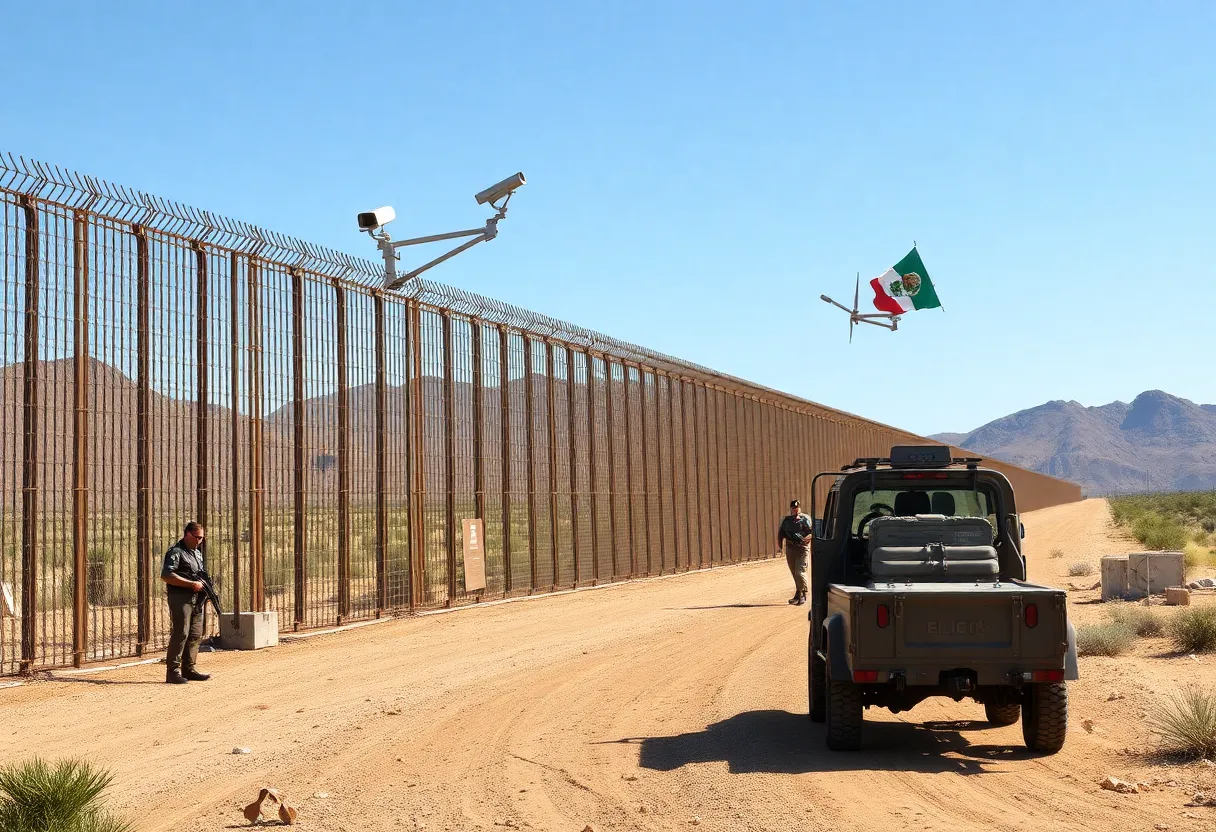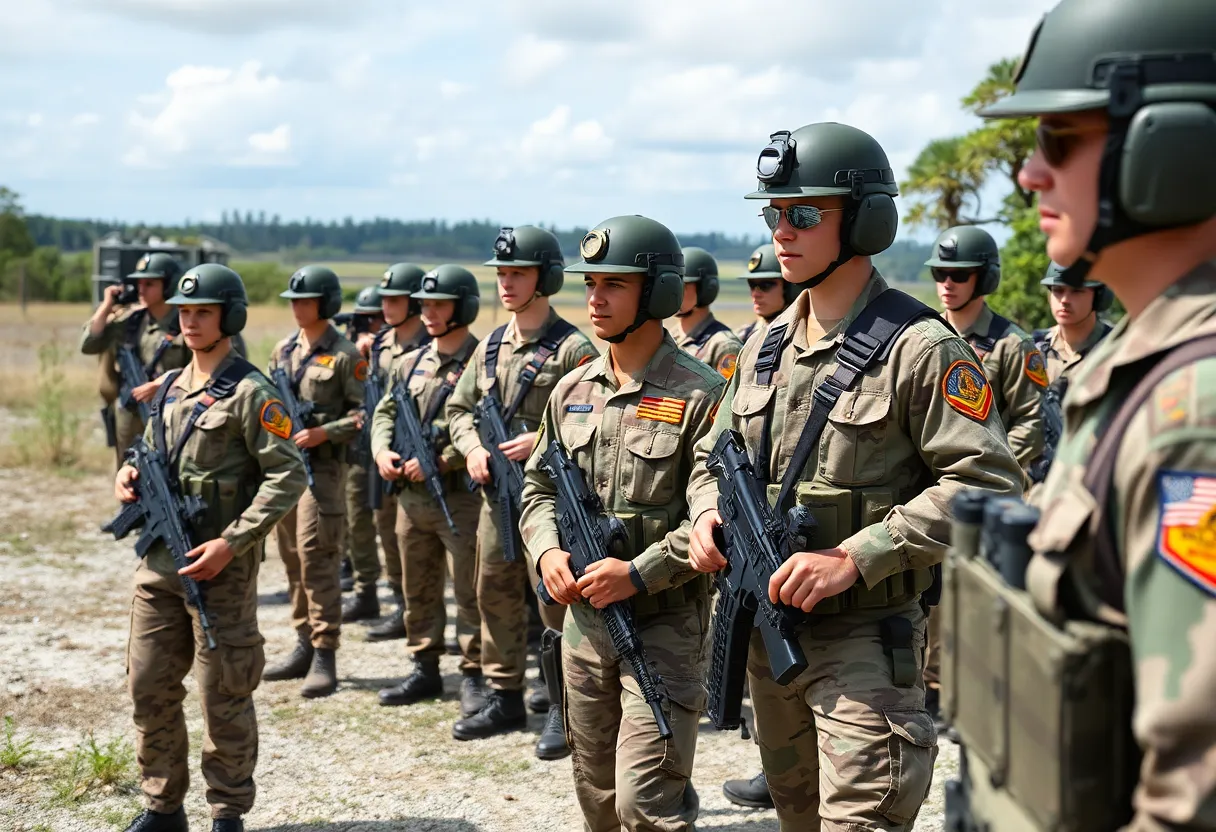News Summary
The U.S. government has deployed 1,500 troops to bolster security at the U.S.-Mexico border amid immigration policy debates. The troops will assist with logistics and surveillance to enable Border Patrol agents to focus on enforcement. Additionally, the federal government plans to expand detention facilities and is facing legal challenges concerning migrant protections. Advocacy groups are mobilizing to support immigrants against potential enforcement repercussions, while concerns about humanitarian aid and taxpayer financial implications remain high amidst growing tensions over funding and enforcement strategies.
Federal Government Steps Up Security at U.S.-Mexico Border
The U.S. government is taking significant measures to reinforce security at the U.S.-Mexico border amidst ongoing discussions and debates surrounding immigration policies. Initially, 1,500 troops are being deployed, with the possibility of adding up to 10,000 more troops to assist in border management. This move aims to support the Border Patrol by handling logistics, infrastructure, and surveillance, allowing agents to concentrate more on direct enforcement actions.
The presence of these troops is not just about adding more personnel; they are intended to provide an extra set of eyes for Border Patrol agents working in the often challenging conditions along the border. By focusing on logistical support rather than frontline enforcement, the hope is to create a more effective security system while freeing up agents for crucial law enforcement duties.
Expansion of Detention Facilities
In addition to troop deployment, the federal government plans to expand detention facilities in the region. This expansion is crucial for improving the ability to hold and process migrants who cross the border. However, there’s a growing awareness among advocacy groups about the potential fallout from increased enforcement and the associated long-term implications.
Advocacy groups, such as LUPE, are actively preparing for any possible impacts on the immigrant community. They are encouraging people to familiarize themselves with their rights and outline action plans in case they’re affected by the ongoing changes.
Legal Actions and Court Decisions
As the situation evolves, legal actions have also come into play. Federal judges in New York and Texas have taken steps to protect Venezuelan immigrants from removal under the Alien Enemies Act. Temporary restraining orders have been expanded significantly, ensuring that all Venezuelans detained in Texas cities, including Houston and McAllen, receive proper legal protection.
These rulings emphasize the necessity for detainees to have a reasonable opportunity to contest their removal—an essential aspect highlighted by recent Supreme Court decisions. Organizations such as the ACLU are involved in ongoing litigation, questioning the application of the Alien Enemies Law during peacetime.
Concerns Over Humanitarian Aid
At the legislative level, there are tense discussions about how to handle funding for border security, with some congressional Republicans pushing to cut federal reimbursements for programs aiding immigrants. There’s a significant push for a considerable influx of funds—$300 billion—to enhance border security measures.
Reopening Detention Facilities
Another controversial aspect of these developments is the reopening of immigration detention facilities, including those in Karnes County and the South Texas Family Residential Center. These facilities, which had previously closed due to reports of poor conditions and human rights violations, are being repurposed under the current administration to detain migrant families.
The South Texas Family Residential Center can accommodate a staggering 2,400 individuals, but concerns over the treatment of families—especially children—have surfaced once again. Activists argue that the shift towards family detention aligns with a broader agenda focused on mass deportations, raising ethical and practical questions about the trauma inflicted on those held in these centers.
Financial Implications for Taxpayers
There are worries about the financial burden such mass deportations could place on taxpayers. Issues surrounding the treatment of detainees and the adequacy of care provided are serious matters that continue to ignite fierce debates. The implications of increased enforcement, both in terms of human welfare and economic responsibility, are topics that will influence discussions for some time.
As this multifaceted situation evolves, the focus remains on ensuring that both security measures and humanitarian needs are effectively balanced. Understanding the legal rights of individuals and the responsibilities of the government are more crucial than ever as we navigate this complicated landscape.
Deeper Dive: News & Info About This Topic
- Kristv: Federal Government Doubles Down on Border Strategy
- Wikipedia: United States–Mexico border
- ABC News: Texas and New York Judges Broaden Temporary Protection for Venezuelans
- Google Search: Immigration Detention Facilities
- Border Report: Fewer Migrants Arriving in McAllen
- Google Scholar: U.S.-Mexico Border Security
- Catholic News Agency: Catholic Bishops Phase Out Migration Programs
- Encyclopedia Britannica: Immigration
- Border Report: Reopening Texas Detention Centers
- Google News: Texas Immigration Detention







